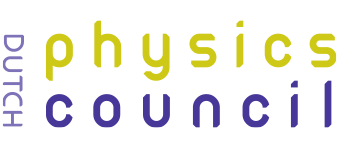Lees deze pagina in het Nederlands
Why physics?
Physics – The Foundation for the Future
Our society faces a number of major challenges related to health and safety, the energy transition, sustainability and climate change. In addition, there is the question how the Netherlands will earn money in a shifting economic landscape. These challenges also offer opportunities, especially for a small country with the ambition and the ability to be an international leader of innovative knowledge-based economies. Physics is the key discipline in meeting these challenges and taking advantage of these opportunities. Physics excels at reducing complex problems to their essentials and basic principles, to a foundational understanding that also finds its way to many innovative applications.
The understanding of the atomic structure led to the development of the laser, and managing and sharing large data streams while investigating the fundamental building blocks of matter spawned the WorldWideWeb; together they form the backbone of the internet. The unraveling of complex molecular structures with so-called nuclear magnetic resonance resulted in magnetic resonance imaging (MRI), a technique that is nowadays indispensable in a modern hospital. Advanced microscopy with hyperspectral imaging, developed for materials research, is currently guiding the hands of the conservators of Rembrandt’s Night Watch.
Despite its relatively small size, Dutch physics is among the absolute top in the world. Dutch physicists excel in these disciplines/research themes (1):
- The physics of life and health
- Energy and climate
- Nanoscience, nanotechnology and advanced materials
- Complex systems, soft materials and liquids
- The (quantum) Universe
- Quantum Technologies
In connection to science education and physics based industry
Our Dutch physics research (within the themes mentioned) stands out because it is challenging foundational and applied, with an excellent connection to other scientific disciplines and the many societal challenges that the Netherlands and the world are facing. It inspires young people, the up-and-coming talent, to increasingly opt for a science education. The increase of these science students in the Netherlands is in line with the great need of the physics-based industry. The economic added value of physics-based research has a wide reach in society as a whole: every euro invested in physics yields 2.64 euro’s economic value, and for employment the multiplier is even greater, 3.34 (2). The Dutch government’s “Wetenschapsvisie 2025” document therefore appropriately states that the business community has a special interest in science, technology, engineering and math education (3).
Building on
From an international point of view, Dutch physics is of a top level, a position that has been established with long-term efforts. To maintain that top position, new initiatives, efforts and investments remain of great importance. As an independent, initiating, coordinating and advisory body, the Dutch Physics council aims to keep physics in top form. In doing so, the Council builds on the work of previous bodies forums, which in various reports have outlined the state of the Dutch (natural) sciences and formulated recommendations, see for example (1), (4) and (5). In addition, an up-to-date snapshot of the Dutch natural sciences was compiled within the framework of the “Sectorplannen Bèta en Techniek”(6).
Reduction of proposal pressure and a good balance
In order to make optimal use of the potential of Dutch physics and to keep the above lines of research strong, the [Dutch Physics] Council currently identifies the following points of attention: The academic staff must be able to adequately fulfill the primary tasks of education, research and associated social contributions. This requires a reduction in proposal pressure and continuity in financing and high-quality infrastructure must be ensured. The Council calls for the insights and creativity to be fully exploited, which is only possible if there is a good balance between free, independent research and more mission-driven research (5).
The Dutch Physics Council, together with universities, industrial partners and research funders such as NWO, will ensure that Dutch physics continues to perform at the highest international level and maintains its role as a key discipline in Dutch society.
The Council has a number of annexes (in preparation) on topics related to Dutch physics, such as Scientific challenges for the (near) future, Economic value, Attracting talent to the Netherlands, Infrastructure, Connection with education. The abovementioned pamphlet text plus annexes can be downloaded from here.
(1) ‘Chemistry and Physics, Fundamental for our Future. Vision paper 2025’, Robbert Dijkgraaf et al., (2013)
(2) www.eps.org/physicsandeconomy
[3) ‘Wetenschapsvisie 2025; keuzes voor de toekomst‘, Ministerie van Onderwijs, Cultuur en Wetenschap (2015)
(4) ‘Koersvast, aanbevelingen van de commissie Breimer ter verdere versterking van de Bèta-disciplines Natuur- en Scheikunde‘, (2015)
(5) ‘Evenwicht in het wetenschapssysteem. De verhouding tussen ongebonden en strategisch onderzoek‘. Bert Weckhuysen et al., (2019)
(6) ‘Een nieuw fundament: beeld van de bètasector‘, Bert Meijer et al., (2018)
